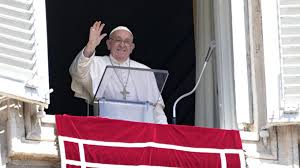
Pope Condemns Ukrainian Ban on Orthodox Church Over Ties to Russia
Overview of the Controversy
Pope Francis has issued a strong condemnation of Ukraine’s recent ban on the Ukrainian Orthodox Church (UOC), citing its alleged ties to Russia. This action by Ukrainian authorities has sparked a significant international reaction, highlighting the complex intersection of religion, politics, and geopolitics amid ongoing tensions between Ukraine and Russia. The Pope’s remarks emphasize concerns about religious freedom and the impact of geopolitical conflicts on faith communities.
Table of Contents
Background of the Ukrainian Orthodox Church Ban
The Ban’s Rationale
The Ukrainian government’s decision to ban the Ukrainian Orthodox Church is rooted in allegations that the UOC has been supportive of or sympathetic to Russian interests. This move is part of broader efforts by Ukrainian authorities to address what they view as threats posed by Russian influence within the country. The UOC has faced scrutiny and criticism for its perceived connections with the Russian Orthodox Church, which is seen as a supporter of Russia’s geopolitical ambitions.
The Ukrainian government’s actions have been justified as necessary measures to safeguard national security and maintain sovereignty amid the ongoing conflict with Russia. However, the decision has been met with significant controversy and debate, particularly concerning its impact on religious freedom and the rights of Orthodox Christians in Ukraine.
Historical Context
The Ukrainian Orthodox Church’s relationship with Russia has been a contentious issue for years. The UOC, which operates as a branch of the Russian Orthodox Church, has been criticized for its perceived alignment with Russian policies and its role in the broader context of Russian-Ukrainian relations. The church’s position has made it a focal point of conflict, reflecting the deep-seated divisions and political tensions between the two nations.
Pope Francis’s Condemnation
Concerns About Religious Freedom
Pope Francis’s condemnation of the Ukrainian ban reflects his broader concerns about religious freedom and the protection of minority faith communities. In his statement, the Pope emphasized that religious groups should not be penalized or discriminated against based on their perceived political affiliations. He stressed the importance of upholding fundamental human rights, including the freedom to practice one’s religion without fear of repression or exclusion.
The Pope’s comments highlight a commitment to principles of religious tolerance and dialogue, even amid complex geopolitical conflicts. His stance underscores the need for a balanced approach that respects religious freedoms while addressing legitimate security concerns.
The Pope’s Appeal for Dialogue
In addition to condemning the ban, Pope Francis has called for dialogue and reconciliation between different religious communities. He urged both Ukrainian authorities and church leaders to engage in constructive discussions aimed at resolving differences and fostering mutual understanding. The Pope’s appeal for dialogue reflects a broader effort to promote peace and cooperation in the face of division and conflict.
Reactions to the Pope’s Statement
Ukrainian Government’s Response
The Ukrainian government has defended its decision to ban the Ukrainian Orthodox Church as a necessary step to counteract Russian influence and ensure national security. Ukrainian officials argue that the ban is not intended to suppress religious freedom but to address concerns about the church’s role in promoting Russian interests within Ukraine. The government’s response reflects its ongoing struggle to balance security measures with the protection of fundamental rights.
Responses from the Orthodox Community
The Orthodox Christian community, particularly those affiliated with the banned Ukrainian Orthodox Church, has expressed strong opposition to the ban and the Pope’s condemnation. Many view the action as an unjustified restriction on their religious practices and an infringement on their rights. The church’s supporters have called for international support and intervention to address what they see as a violation of religious freedoms.
International Reactions
The Pope’s condemnation has resonated internationally, with various religious and human rights organizations expressing support for his stance on religious freedom. The statement has drawn attention to the broader issue of how geopolitical conflicts impact religious communities and their rights. International observers and advocates have emphasized the need for a balanced approach that respects both security concerns and fundamental human rights.
Broader Implications
Impact on Religious and Political Relations
The controversy surrounding the Ukrainian Orthodox Church ban and the Pope’s condemnation highlights the intricate relationship between religion and politics. The situation underscores the challenges of navigating religious freedoms in the context of geopolitical conflicts and national security concerns. The ongoing debate reflects broader issues of how to balance religious rights with political and security considerations.
Potential for Increased Tensions
The Pope’s condemnation may contribute to increased tensions between Ukraine and the Vatican, as well as between Ukrainian authorities and Orthodox Christian communities. The situation could further complicate diplomatic relations and impact efforts to address broader regional conflicts. The need for careful diplomacy and constructive engagement will be crucial in resolving these issues and ensuring that religious freedoms are protected while addressing legitimate security concerns.
Conclusion
Pope Francis’s condemnation of the Ukrainian ban on the Ukrainian Orthodox Church underscores the complex intersection of religion, politics, and geopolitics. His emphasis on religious freedom and dialogue highlights the need for a balanced approach that respects fundamental rights while addressing security concerns. As the situation unfolds, the international community will continue to watch closely, seeking solutions that uphold religious freedoms and promote peace and reconciliation in a troubled region.







